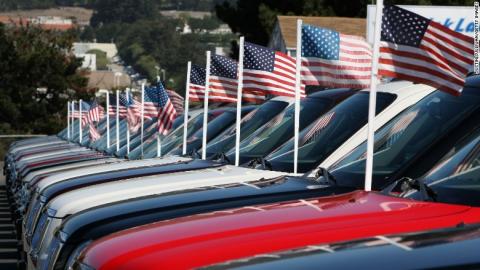Share
Congress Rolls Back Anti-Discrimination Auto Loan Rule

Government exists to protect its citizens and improve their lives. It does not exist to serve corporations, unless of course, Republicans are in power.
The House on Tuesday [May 8th] passed a measure to roll back guidance on auto lending issued by the Consumer Financial Protection Bureau. The guidance, issued in 2013, was intended to limit discriminatory practices in the auto loan business.
The legislation was approved 234-175, with 11 Democrats joining Republicans. The move by the House came weeks after the Senate approved the measure. It now advances to Trump, who is expected to sign it into law.
The guidance had a purpose - to cut down on discrimination in auto lending and penalize those who did.
The guidance targeted on Tuesday restricted auto lenders’ ability to charge extra interest on certain loans offered at dealerships. The CFPB said it developed the rule because some minority borrowers were charged more than white borrowers through a practice called “dealer markups.” The CFPB levied tens of millions of dollars in fines on auto lenders between 2013 and 2016, including Ally Financial Inc. and Toyota Motor Credit Corp.
Democrats said the move would lead to racial discrimination in auto lending. “I too was one of those black people that lived in one of those ZIP Codes and was discriminated against in my car loan,” said Rep. Gwen Moore (D., Wis.), speaking ahead of the vote on the House floor.
They did this using a legal method almost never used AND in a new underhanded way.
Congress repealed the guidance using the Congressional Review Act, a little-known law that allows Congress to undo the rules issued by administrative agencies and government regulators. Republicans used the act in 2017 to repeal more than a dozen Obama-era regulations. Prior to 2017, the Congressional Review Act had been used only once since being passed in 1996.
Normally, the act requires Congress to exercise this power within a narrow window of time — 60 days after the new regulation is submitted to Congress.
But Tuesday's vote marks the first time it has been wielded to reverse administrative guidance — meaning the regulatory agencies' interpretations of federal laws. Because most guidance is not "submitted to Congress," lawmakers argue they can start the clock whenever they want on hundreds of rules issued over the past two decades. Critics worry this could open the door for congressional rollback of any number of hard-fought consumer and environmental protections. And because the act also prevents federal agencies from re-enacting "substantially similar" regulations and guidance, it means that reinstating the rules could require future congressional action.
The vote is the first test for a new strategy employed by Republicans in Congress, which could enable the repeal of hundreds of administrative regulations passed in recent decades.
Such as:
Congress might soon try to overturn other long-settled Obama-era policies. Industry executives and Republican lawmakers are scouring other administrative guidance and documents issued without a formal rulemaking process to see if the legislative tool could be used to kill them. Vulnerable policies are seen in areas including energy, the environment and financial services, according to industry officials and lobbyists.
The goal is to put together a list of potential targets and quickly send it to the GAO for review so Congress can act before campaign season kicks in. Lawmakers likely have little time to act before business in the Capitol grinds to a halt ahead of the midterms.
Sources:
https://www.npr.org/2018/05/08/609468562/congress-rolls-back-anti-discrimination-auto-loan-rule
https://www.wsj.com/articles/congress-overturns-obama-era-auto-loan-rule-1525813277
